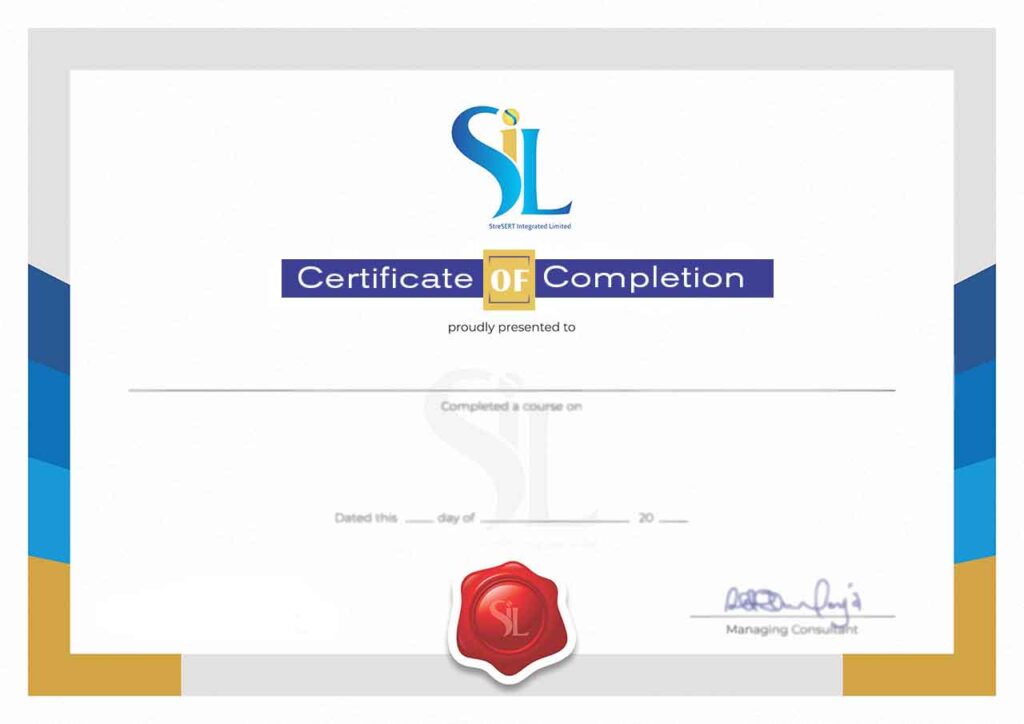QUALITY ASSURANCE (AND CONTROL MANAGEMENT) IN HOSPITALS
Instructor: Industry Expert-Led
Group enrollment is available for Teams. Learn more
Professional Course
Certificate Ready
Our comprehensive Certificate-Ready Course is designed to equip you with the knowledge, expertise, and credentials you need to excel in your field
Virtual & Physical Classroom
Virtual and Physical Classes. Whether you prefer the convenience of studying from the comfort of your home or the interactive experience of an in-person classroom, we have you covered.
+234 806 788 0956
Do you have any questions about the course? Talk to our Expert now
What you'll learn
Quality products and services to customers make an important contribution to long-term revenue and profitability and it is critical to maintain customer satisfaction and loyalty and reduce the risk and cost of replacing faulty goods. Your customers expect you to deliver quality products. If you do not, they will quickly look for alternatives.
Quality assurance is any systematic process to ensure that the end product or service being developed is meeting the specified requirements, its intended use, to fully satisfy customers’ needs and expectations, and is produced consistently with zero defects. It is a way of preventing mistakes or defects in manufactured products and avoiding problems when delivering solutions or services to customers. Quality obviously is influenced by the complexity of the end product, the number of processes required to make the product, and the exactness with which those individual processes are defined and controlled.
Software Quality Assurance consists of monitoring software engineering processes and methods used to ensure quality and can include ensuring conformance to standards and regulatory compliance. It provides confidence that quality requirements are fulfilled.
Objectives
At the end of this training, you will learn to:
- Define the major benefits to the organization of Total Quality Management
- Understand the impact of leadership to support quality management systems.
- Develop measuring and improvement processes for quality assurance and control.
- Describe how TQM can be introduced into their workplace.
- Identify useful quality improvement techniques for continual improvement.
- Discuss the importance of quality standards, models and awards (ISO, TQM, Malcolm Baldrige, EFQM etc.)
Skills you'll gain
Training Methodology
This course is highly interactive and encourages delegate participation through a combination of lectures, group discussion, practical exercise, case studies, and breakout session designed to reinforce new skills. The comprehensive training course has been designed to be practical, easy to use and facilitate learning. Delegates will gain the skills and motivation they need to create long-lasting change.
Organisational Impact
There will be increased organizational performance by result of:
- Improved Quality Assurance and Control Processes and techniques
- A shared organizational vision for promoting Total Quality Management
- Improved Employee Morale and Cooperation
- Increased Profitability and Efficiency
- Enhanced Planning, Quality Assurance, and Quality Control Measures
- Improved Leadership and Team-building Skills
Personal Impact
- An increased appreciation for their role in helping their organization achieve improved quality management, assurance, and control.
- Up-to-date techniques and methods to help them provide Total Quality Management for continual improvement.
- Enhanced leadership and team-building skills required to excel in their career.
- Improved active listening and questioning skills to enhance communication effectiveness.
- Increased problem solving and critical thinking skills.
- An understanding of which business improvement techniques are applicable in given situations.
Who Should Attend?
- Senior Management
- Quality Assurance and Quality Management Managers and Staff
- Department Managers
- Team Supervisors
- Human Resource Managers
- Training Managers
- Customer Service Professionals
Course Details
DAY 1
- Introduction to Quality Assurance and Control Improvement Techniques
- Quality Assurance and Control Principles
- The Concept of Total Quality Management
- Principles of Quality Assurance and Control
- The Core Principles in Achieving Total Quality Management
- Prevention Not Correction
- Identifying Opportunities for Organizational Continuous Improvement
- Building Quality through Teamwork
DAY 2
- Techniques for Quality Assurance and Control Improvement
- Process Improvement
- Benchmarking: A Point of Reference
- Implementing a Culture of Quality – The Role of Total Quality Management
- Benefits of Quality Assurance and Control Improvement – Improvement Activities for Your Organization
- Benefits of Implementing Total Quality Management, “best practices.”
- The Importance of Attitude and Professional Development
- Setting SMART Objectives for Continuous Improvement
Frequently asked questions
a. How do I register for the course?
To register for the course, please visit our course webpage and click on the “Register” button. Follow the instructions provided to complete the registration process.
b. What should I do if I encounter problems while registering?
If you encounter any issues during the registration process, please reach out to our support team at [email address] or [phone number]. They will assist you in resolving the problem and completing your registration.
c. I didn’t receive a confirmation email after registration. What should I do?
Please check your spam or junk folder for the confirmation email. If you still haven’t received it, kindly contact our support team with your registration details, and they will assist you in ensuring you receive the confirmation.
a. Can I register as a team or group for the course?
Yes, we offer the option for team or group registration. You can enroll multiple members together as a team for the course.
b. What is the maximum number of members allowed in a course team?
The maximum number of members allowed in a course team may vary depending on the specific course. Please refer to the course details or contact our support team for more information.
c. How do we register as a team, and is there a separate process for team registration?
To register as a team, please visit our course webpage and look for the team registration option. Follow the instructions provided to register your team. The process may involve submitting the details of each team member. If you require any assistance, please reach out to our support team.
a. What topics are covered in the course?
The course covers a comprehensive range of topics related to [specific course subject]. Some of the key areas covered include [list key areas/topics covered in the course]. For a detailed breakdown of the course content, please refer to the course syllabus on our website.
b. Is the course self-paced, or does it have a fixed schedule?
Our course offers a flexible learning experience. It is designed to be self-paced, allowing you to study at your own convenience and progress through the materials at your preferred speed. You can access the course content and complete assignments within the provided timeframe.
c. Are there any prerequisites for taking this course?
Some courses may have prerequisites or recommended prior knowledge. Please refer to the course details or prerequisites section on our website to determine if there are any specific requirements for this course.
d. Can I access the course materials after the course completion?
Yes, you will have access to the course materials for a specified duration even after completing the course. This allows you to review the content, revisit key concepts, and continue learning at your own pace.
a. How long does the course last?
The duration of the course varies depending on the specific program. It can range from a few weeks to several months. Please refer to the course details or contact our support team for the exact duration of this course.
b. How many hours per week should I dedicate to the course?
The recommended time commitment per week for this course is approximately [number] hours. However, as the course is self-paced, you can adjust your study schedule based on your availability and learning preferences.
c. Can I complete the course at my own pace?
Absolutely! The course is designed to be flexible, allowing you to complete the modules and assignments at your own pace. You can study at a speed that suits you and fits your schedule.




